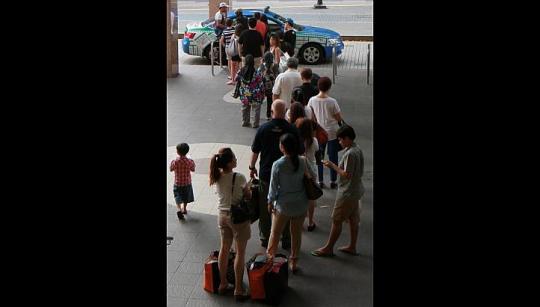Taxi woes and the ghost of 1985
Taxi woes and the ghost of 1985

 Whenever the state of the taxi service is discussed, my mind goes back to 1985.
Whenever the state of the taxi service is discussed, my mind goes back to 1985.
That, in my view, was the last time the Government tried to tackle the problem in a fundamental way.
But that experience was so painful, no transport minister since has had the appetite to take on the issue.
Which is why the problems persist, almost 30 years on.
What is the issue?
The Straits Times carried several stories in recent weeks of taxi queues in the city during the evening, with waiting times much longer than they were a year ago.
A Sri Lankan businessman was quoted as saying: "It's the worst thing I hate about Singapore - standing in taxi queues."
One statistic alone tells the story of how poorly the service here compares with that in other cities: Singapore has 29,000 taxis, Hong Kong has only 18,000. But despite their fewer numbers, Hong Kong taxi drivers make more than a million trips a day, compared with fewer than a million here.
So what's happening?
That 1985 saga was instructive. I know because I was in the thick of it as a young officer at the then Communications Ministry.
The problem then was exactly the same as it is now. Commuters complained they could not get a taxi when they wanted one, that taxi drivers were choosy, refusing to pick up passengers headed for certain destinations, or disappearing just before midnight when the surcharge kicked in.
Sounds familiar?
At the ministry, it seemed like a straightforward analysis - taxi fares in Singapore were too low, relative to buses and the cost of owning a car. If four people shared a cab, it would be cheaper than taking the bus.
The solution? Raise taxi fares substantially to reduce demand, and solve the problem once and for all.
But that wasn't all - taxi diesel taxes were also increased to make the cost of owning and running them closer to that of a privately owned car.
The theory was sound but, alas, we guessed wrongly how sensitive commuters would be to a big fare hike.
Demand for taxis plunged so much that taxi drivers' earnings went down despite the higher fares.
There was an uproar: Commuters were unhappy over the increased cost, and taxi drivers were up in arms that their earnings had gone down.
The Government had to do an embarrassing U-turn, moderating both the fare and tax increases of the original plan.
More significantly though, and with serious implications for the future, it backed off from trying to intervene in the taxi business.
So fares were later deregulated and no longer decided by government but left to taxi companies to determine. The number of taxis on the road was also left to the market until recently.
But the problems have not gone away, hence the spate of newspaper reports lately.
Many suggestions have been made to improve the situation - getting rid of the surcharges, simplifying the fare structure, imposing a minimum cruising mileage, and so on.
Indeed, the Land Transport Authority has just announced changes to the rule requiring operators to have a certain proportion of their fleet on the road during peak hours.
These moves are worth trying.
But I am afraid they will not solve the problem unless Singapore is clear about the role of taxis in its overall transport system.
Unless this is settled, the patchwork of measures that have been tried over the years will continue to frustrate.
Unlike buses and the MRT, which run on fixed routes, taxi demand is more unpredictable, driven by those whose needs cannot be met by public and private transport.
This includes regular bus and MRT commuters who occasionally use taxis, tourists, and even motorists who sometimes find it more convenient not to drive.
How to devise a system to meet so many of these different needs with no obvious pattern to them?
It turns out that getting the price right is the most important.
If it is set too low, demand will surge and service levels will deteriorate unless the roads are flooded with taxis, which isn't possible without causing serious traffic congestion.
If it is set too high and demand collapses, neither commuters nor drivers will be happy, as was the case in 1985.
Because it is so important to get the price right, it cannot be left to taxi companies to decide. They have other commercial considerations when setting the price and may not necessarily take into account the proper role of taxis in the overall transport system.
Indeed, as many critics have pointed out, because their revenues come from renting the taxis out, they have no direct interest in providing good service, apart from meeting minimum regulatory standards.
For these reasons, the correct fare level ought to be decided by the transport authorities, taking into account the overall transport system.
In Singapore, this price should be pegged between public and private transport.
One other factor needs to be taken into account, which is often overlooked.
This is the effect price has on taxi driver behaviour.
If the price is set too low, cabbies have to pick many fares through the day to make a decent living. Each fare then becomes relatively unimportant because it represents a smaller part of his overall earnings, as he knows he can pick another fare just round the corner.
Taxi drivers operating in this scenario tend to be choosy about the fares they pick.
On the other hand, if the price is set higher and demand is lower, you can expect better service as every customer contributes a larger share to the driver's earnings.
It's the difference between a supermarket and a boutique.
Both types of taxi service can be found all over the world - the supermarket model prevailing in developing countries, whereas in, say, Tokyo or London, it's a boutique service.
What's critical is that whichever model is chosen must not result only in better service for commuters but also give taxi drivers a better deal going forward.
Their livelihood has to be a priority because a good taxi service can happen only when cab drivers believe there is a secure future for them, they earn decent wages, and have a profession that others respect.
So, whenever changes are made to the taxi service, one critical question to ask is: Will taxi drivers be better off as a result?
There is much work that needs to be done to make these fundamental changes that will result in permanent improvements to the taxi service: determining which taxi model is best for Singapore, setting the correct fare level, the number of taxis needed, the cost of owning and operating them, and the way the business is operated.
These issues require decisions that only the Government can make. But it has to first exorcise the ghost of 1985.
-- ST PHOTO: Neo Xiao Bin
by Han Fook Kwang



4 Comments
Recommended Comments
Create an account or sign in to comment
You need to be a member in order to leave a comment
Create an account
Sign up for a new account in our community. It's easy!
Register a new accountSign in
Already have an account? Sign in here.
Sign In Now